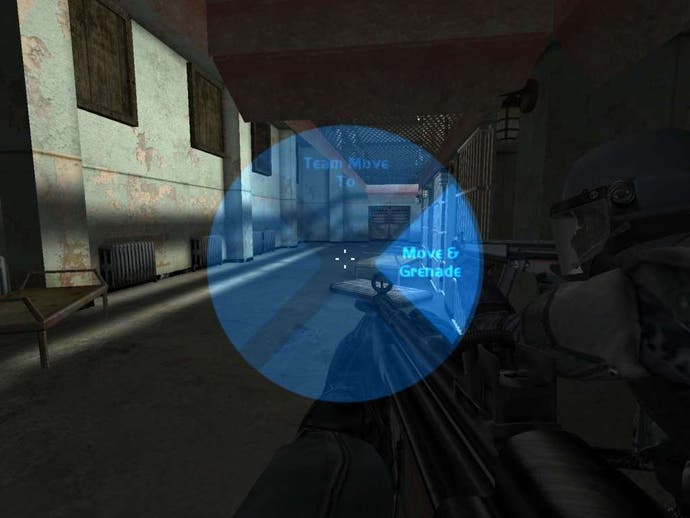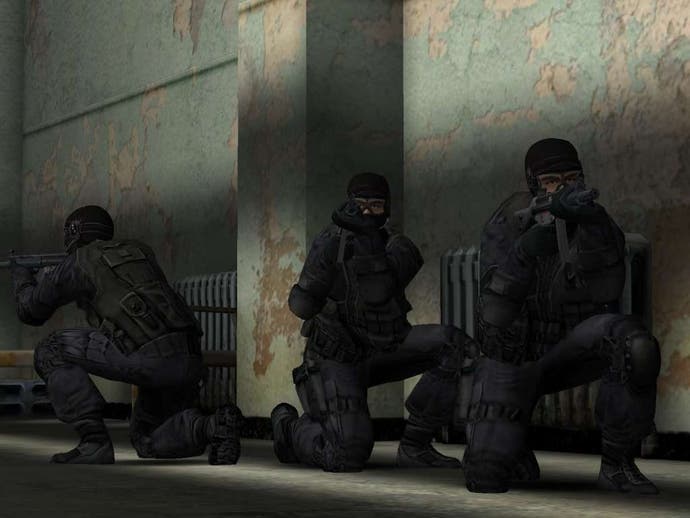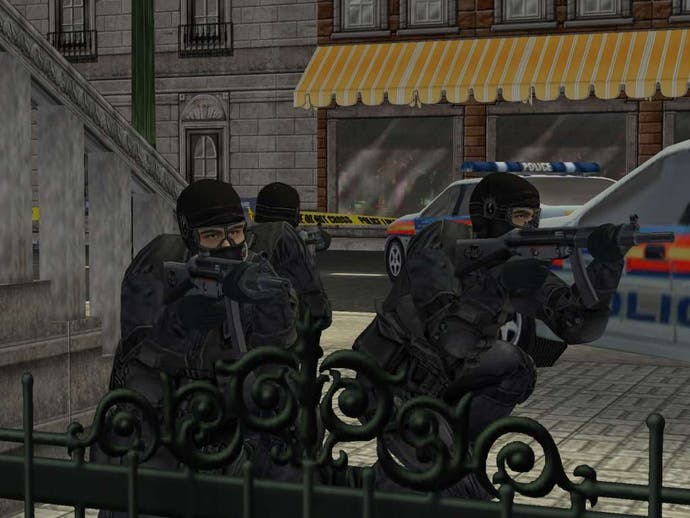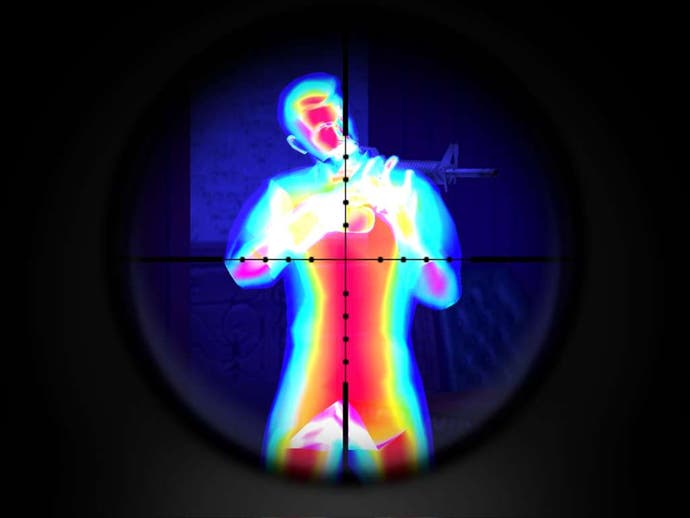Rainbow Six : Raven Shield
Hands On - we take the latest episode of the multi-million selling Rainbow Six series for a spin
Although Rainbow Six wasn't the first 3D tactical action game, it was arguably the first game in the genre to really get the formula right. Since then developers Red Storm have built on its success with mission packs, spin-offs and a sequel, all based around tweaked versions of the same increasingly dated graphics engine.
The third full game in the series, Raven Shield, is something of a departure for Rainbow Six. Not only does it sport truly jaw dropping visuals courtesy of the latest Unreal technology, but the gameplay has also been tweaked, and development duties have passed on to Ubi Soft's Montreal studio. We braved the British weather and Slough's indigenous rodent population to have a shufti at the latest build of the game...

Making Plans
As in previous Rainbow Six titles, every mission begins with the all-important planning phase. Here you can pick your team members, select the weapons, equipment and camouflage they will use, examine a map of the area you will be fighting in and set out devious plans made up of dozens of waypoints and complex commands.
The difference is that in Raven Shield, players can now skip any or all of these stages and play on with a default four man team armed with a preset load-out. You don't even need to worry about laying plans; if you want, the game can simply drop you and your men into the map at an insertion zone, give you a single waypoint, and leave you to it. In Rainbow Six this would have been a recipe for disaster, but in Raven Shield you have far more control over your men within the game, meaning that planning isn't the make or break experience that it was before. If there's an unpleasant surprise waiting for you, you can abandon your plan, ignore the waypoints, and just tell your squad to follow you.
Ubi Soft seem to have taken a leaf from the excellent SWAT 3, as your men can now be given a variety of commands using a simple interface, doing away with those horrible Rainbow Six moments when your entire plan came crashing down fifteen minutes into a mission and you were left with no option but to start again from scratch. Want your men to clear a room for you? Just face the door, hold down the spacebar, and select whichever option takes your fancy from the wheel that appears in the middle of your screen. With a few key presses you can tell your men to open the door, lob in the grenade of your choice, wait for it to go off and then charge in to clear out any survivors.

Brains
Something else which has got a much-needed overhaul is the AI. Raven Shield lead designer Mike McCoy admitted that "the AI in Rogue Spear wasn't smart enough that you'd want them to come with you", and you could find your cunning plan foiled by a narrow corridor, a door that opened the wrong way, or your men's inexplicable decision to walk up behind a terrorist and tap him on the shoulder instead of shooting him.
Raven Shield is a giant leap forward for the Rainbow Six series when it comes to AI. Your men rarely get stuck and show far better awareness of their surroundings, checking side passages and occasionally turning to make sure nobody is behind them as you move through a level. Walk into a room and they will all face in different directions, covering as many entry points and potential danger spots as possible.
The opposition has had an upgrade as well, and terrorists should now work together in teams, with their behaviour depending on how scared and how professional they are. A frightened, poorly trained terrorist might turn tail and run for it in the middle of a shoot-out, or try to fetch help. The early build that we played still had some shortcomings in the AI department, particularly when it came to reacting to nearby gunfire (or not reacting at all, as was often the case), but as Raven Shield isn't due out until November we're hopeful that these issues will be ironed out by the time the game ships.

Scoping Ahead
Although the improved AI and the addition of more in-game control over your men has reduced the importance of the planning phase, that doesn't mean that it is being ignored. Rainbow Six veterans can look forward to a revamped interface, a cleaner, less cluttered map and the addition of a proper 3D view.
As before, players can lay down waypoints on the map and assign orders to them, such as varying the speed or behaviour of your men or telling them to stop and lob a grenade at a certain point. Hold points can be set up where other squads will stop until you give them the order to advance, and you also now have a "milestone" waypoint option, which will cause the squad to tell you when they've reached that point in the plan without stopping. The addition of the 3D view is a real boon as well, allowing you to see the lay of the land as it will look when you hit the go button. You can examine your surroundings from any point on the map, checking for visibility, possible sniper spots and available cover. Hit the play button and you can sit back and watch as the game whisks you through the path that you've set up for your squads. It's a simple idea, but should really help hardcore players hone their plans to perfection.

Not Just A Pretty Face
Obviously the biggest change in Raven Shield is the graphics, and the designers have put the Unreal engine to good use. Settings are utterly believable, your squad mates nicely detailed and beautifully animated, and you can even see what other characters are carrying at a glance - grenades appear dangling from their belts, and spare weapons will be holstered.
Rainbow Six's new found graphical prowess isn't just about looking pretty either, it can also add to the gameplay. The thermal vision scope, for example, has received a lot of attention. Not only does it look great, but it adds another tool to help you detect any possible threats, although we're a little concerned that it might interfere with the flow of the game, especially in multiplayer. Grenades have also been given an overhaul; the explosion of a flashbang near you will reduce your vision and cause a ringing in your ears to disorientate you, while getting caught in a cloud of tear gas blurs the screen as you look around, leaving trails that make it harder to pick out enemies accurately.
Other new features include an improved peek mode, similar to the one found in Medal Of Honour : Frontline on the PlayStation 2. Not only can you now lean out while moving, but if you hold down the right key the mouse will shift your body without moving your feet, allowing you to lean gradually around a corner or crouch and stand to make the most of cover. Raven Shield also adds a full prone (lying down) option for the first time in the Rainbow Six series, and doors and windows can be opened gradually using the mousewheel to "slice the pie", letting you check a room a bit at a time without exposing yourself rather than simply flinging the door open and hoping for the best.
Conclusion
Raven Shield features some pretty drastic changes to the Rainbow Six formula, but it's a logical next step for the series. A combination of a simplified but more powerful than ever planning stage, more flexible in-game orders and vastly improved AI and graphics should help Rainbow Six regain its crown as king of the tactical shooters. There's still some work to be done - the AI isn't quite perfect yet, and the beta version we played had a lousy framerate - but the potential's certainly there. And with an Xbox version expected to appear soon after the PC release, and PlayStation 2 and GameCube ports to follow next year, Raven Shield could bring Rainbow Six to an even wider audience.

